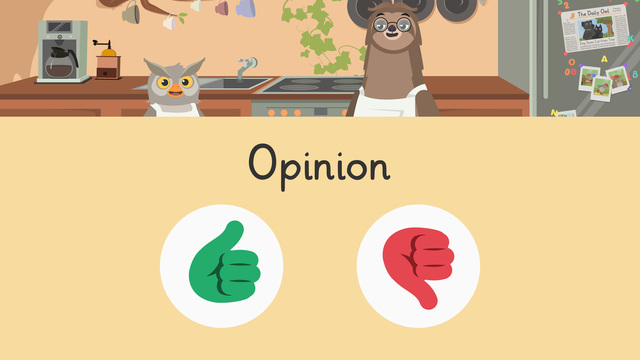Opinion Writing: Conclusion


Basics on the topic Opinion Writing: Conclusion
A conclusion is the part of writing that brings together the main points. Learn here about writing the conclusion to a piece on opinion writing.
Transcript Opinion Writing: Conclusion
Jane and Ernie just missed the zip wire excursion they had planned and are having a disagreement about who's fault it is and what makes a good friend. Let's help them summarise their opinions by learning about opinion writing: conclusion. An opinion is someone's thoughts or views on something, and they're not always the same. Today, Jane asked Ernie to pick up the gear for the excursion while she was busy. Instead, Ernie packed their lunches and was ready when Jane came back. As a result, there wasn't enough time to pick up the gear before their excursion, so they couldn't go. Jane is upset because she thinks part of being a good friend is listening and paying attention. Ernie is upset because he was trying to be a good friend by making sure lunch was ready for the big day. Hey, Ernie, Jane! Here's an idea, instead of arguing why don't you write about what makes a good friend? Both Ernie and Jane have stated their opinion and supported it with reasons, but they're missing a conclusion. The conclusion restates the opinion and summarises the main points or reasons for the opinion. It provides a sense of closure to the reader and is a final opportunity to state your point of view. Conclusions can start with the following phrases: ‘to summarise, to sum up, as you can see, I feel, I believe, I think, and in conclusion' to name a few. We're going to help Jane write her conclusion, but first let's read what she's written so far. ‘I think being a good friend means listening and paying attention to each other. It shows that you care about what they are saying and helps them feel valued. Plus, you won’t miss important information, such as when I asked you to pick up the gear today. While I appreciate you making lunch, we missed our excursion.' What is her opinion? Jane's opinion is that being a good friend means listening and paying attention to each other. Jane's conclusion needs to restate her opinion and it also needs to quickly restate the reasons for her opinion. One possible conclusion could be, 'In conclusion, a good friend listens and pays attention to show that they care and value what's being said, and so they don't miss any important information.' Notice that Jane used the conclusion phrase 'In conclusion', and restated her opinion. When we restate something, we are rewording it using synonyms. Jane also reworded her reasons to make them short enough to fit into the conclusion statement. Now, let's help Ernie write his conclusion. His text says, 'I think being a good friend means doing small things to take care of one another. It shows that you care and makes them feel good. Plus, it can ease the number of responsibilities they have. Making lunch for everyone is a nice thing to do and eating is important.' What is Ernie's opinion? Being a good friend means doing small things to take care of one another. Ernie's conclusion also needs to restate his opinion and quickly restate the reasons for his opinion. What is one possible conclusion? One possible conclusion could be, 'As you can see, good friend do small things to take care of one another so they feel good, know you care and have fewer responsibilities to take care of.' While Ernie and Jane calmly share their points of view, let's summarise. The conclusion restates the opinion and summarises the main points or reasons for the opinion. Conclusions can start with the following phrases: ‘to summarise, to sum up, as you can see, I feel, I believe, I think, and in conclusion' to name a few. It looks like Ernie and Jane ended up completing the zip wire after all! "Thanks for packing lunch, I'm starving!" "Hey, Jane?" "Yeah Ernie?" "You're my best friend."

 Do you want to learn faster and more easily?
Do you want to learn faster and more easily?
















